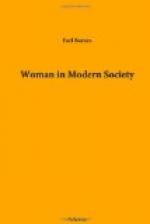Knowledge, in the past, has nearly always been considered much as we consider dynamite to-day. It was a dangerous force, useful to a ruling class, and hence preserved in the hands of a cult, generally a priesthood; but it was thought capable of working endless mischief in the hands of ignorant people. Through all the pages of history we find individuals, and weaker groups, driven away from the accumulated treasure; and if detected in their desire to know, especially if they sought knowledge through original investigation, they were branded with such titles of disgrace as “wizard” or “heretic;” and, as a warning to others, they were often burned in the public square or buried alive.
Women, as an inferior class, were especially restrained from learning. Knowledge would breed discontent in them; it would make them question the binding power of the conventions and beliefs which held them in their place; and it would show them how to achieve their freedom, and might even encourage them to assume leadership. Here and there, individual women gained the training necessary for leadership, as in the cases of Sappho, Aspasia or Hypatia; but the great mass of women was sternly repressed. Eve leads a long line of women martyrs who, across the ages, have paid a great price for their desire to eat of the tree of knowledge. For herself, she might have paid the price but, with subtle understanding of women, the penalty was made to involve all whom they loved; the terrors of that price have held the sex in restraint ever since. Eurydice, Pandora, Eve, Lot’s wife and Bluebeard’s wife have in turn served as awful warnings. After a time it came to be understood by women that they should fix their eyes on their husbands and never look forward or backward, lest they lose their Eden and drag those whom they loved after them to destruction.
Of course, if women could not learn they could not teach; at least, they could not teach where it was necessary to impart knowledge; and so their share in formal education has been slight, until our own time. Young children have been considered their special charge, and the care and culture of infancy and young childhood have always rested in the hands of mothers, grandmothers, aunts and female servants. Beyond these early years, however, woman’s part has been restricted to emphasizing, mainly with girls, the dogmas and practices of caste, kitchen and church.
These were the conditions which prevailed through early Oriental and Classical times. Christianity brought women some degree of intellectual freedom, but it also imposed new forms of restraint. Its fundamental teachings, based as they were on a belief in individual values, were favorable to the extension of knowledge and to the opening of opportunity for all. The Church, however, shaped under the half-civilized conditions of the Middle Ages, quickly took knowledge into her own keeping, forbade its extension, and increasingly held before woman, as her highest ideal, the negative virtues of the cloister.




